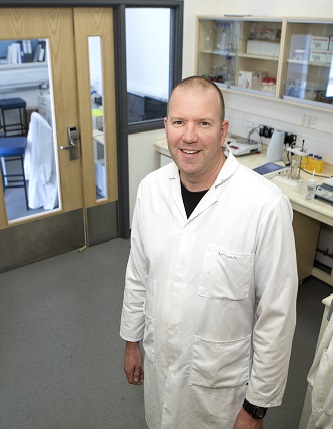To return to the bench after being away for such a long time felt challenging – but I was ready to return.
Prior to starting his Daphne Jackson Fellowship, Anthony Wynne was combining working as a builder, running two successful small businesses and being chief carer to his two preschool daughters.
Anthony had originally started out in a different career. Having gained a BSc in Biotechnology from South Bank University London in 1995, he had an illustrious start to a career in microbiology working in a range of technical research roles at the Institute of Food Research, which later became part of the University of Reading. Anthony worked for two years there as a research assistant, where he became project leader on three separate projects over the course of six years, producing several papers, patents and book chapters throughout his time there.
After getting married in 2003 and travelling the world for 18 months as an extended honeymoon, Anthony and his wife then decided to set up home in the south west of England due to their love of the water and water sports. Previously Anthony has canoed for the British team.
He initially tried to find research work but was unsuccessful and could only find low paid manual work in the building and construction industry. His wife, a successful project manager, then became pregnant and they went onto have two daughters together, born three years apart. It made financial sense for Anthony to become the primary care giver for his two daughters and he chose to take a prolonged break from his research career to look after them, albeit temporarily. As his daughters became more independent, Anthony was able to set up and run two successful small businesses, one in construction and the other in yachting.
However, Anthony’s love of and passion for science never faded. He continued to apply for research jobs, but without success.
I was disappointingly told in interviews that the gap in my C.V. made me uncompetitive with other applicants.
Despite this, Anthony kept abreast with developments in the field by keeping up with the literature and attending conferences, when he was able to. Once his daughters were older and settled at primary school, Anthony decided to embark seriously upon a return to research and leave the businesses he had set up.
I kept my passion for science and developed my own research into the area of metabolic diseases such as type 2 diabetes and obesity. I attended conferences and read literature in my spare time in the evenings, and listened to scientific talks whilst working in the daytime as a builder.
Anthony found out about the Daphne Jackson Trust through an article in a magazine and made contact Dr Helen Marsh, one of the charity’s Fellowship Advisors. With his daughters now both at school, he proposed attending Plymouth University to carry out his laboratory work during school hours and to work from home when required. A Professor at Plymouth University, a previous contact of Anthony’s, was happy to support him with his application for a Fellowship at the same University.
My initial thought was what a unique and fantastic opportunity for me! I could retrain and get back into research in an academic setting, update my skills and knowledge. The part time and flexible aspect of the Fellowship as 0.5 FTE was very attractive and meant I could continue looking after my children including outside of school hours and in school holidays.
Given this opportunity, I am extremely motivated to re-develop my scientific career. I would like to use my knowledge and experience to add value to the world around me and inspire my daughters who both want to be scientists too!
- Two-year Fellowship, started in 2015
- Hosted by Plymouth University
- Fully sponsored by the Biotechnology and Biological Sciences Research Council (BBSRC), the largest UK public funder of non-medical bioscience in the UK
- Supervisor: Dr Charles Affourtit
- Research area: Nitrite and Mitochondrial Function

